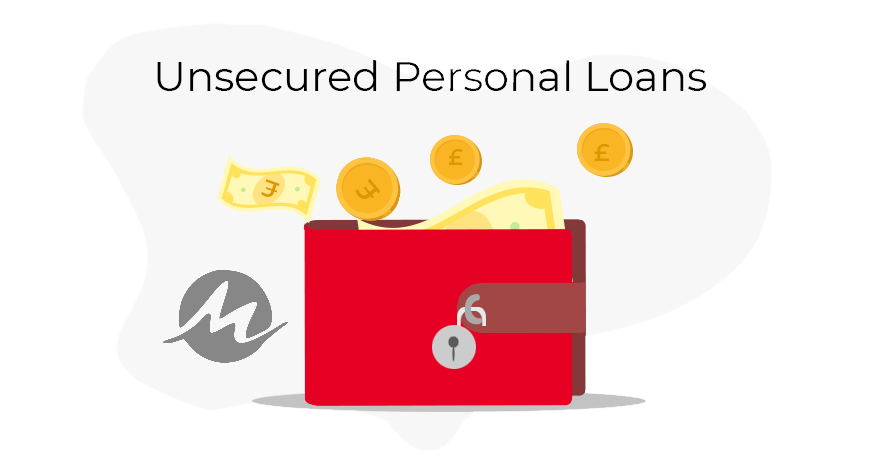Don't waste your time. Get a loan online.
Unsecured Personal Loan

What is an Unsecured Personal Loan?
An unsecured Personal loan is a loan that doesn’t require any type of collateral. Lenders approve unsecured loans on the basis of creditworthiness, not assets. Personal loans, student loans and credit cards are all examples of unsecured loans.

KEY TAKEAWAYS
- Unsecured loans are supported by only the borrower’s creditworthiness and not any collateral such as property or assets.
- Unsecured loans can be more risky than secured loans, so lenders will require higher credit scores to approve them.
- Unsecured loans include student loans, credit cards, and personal loans.
- Lenders may send a collection agency to collect a debt if a borrower defaults.
- Lenders have the ability to decide whether or not to approve an unsecured loan based upon a borrower’s creditworthiness. However, laws protect borrowers against discriminatory lending practices.

How Unsecured Loans Work
Unsecured loans, also known as signature loans and personal loans, can be approved without the need to use any property or other assets for collateral. The terms of these loans, including approval and receipt, are most often contingent on a borrower’s credit score. For unsecured loans to be approved, borrowers need to have a high credit score.
An unsecured loan stands in contrast to a secured loan, in which a borrower pledges some type of asset as collateral for the loan. Lender’s “security” increases when the borrower pledges assets to secure the loan. Secured loans can be mortgages or car loans.
Don't waste your time. Get a loan online.
Because unsecured loans require higher credit scores than secured loans, in some instances lenders will allow loan applicants with insufficient credit to provide a cosigner. A cosigner takes on the legal obligation to fulfill a debt if the borrower defaults. This happens when the borrower fails to pay principal and interest on a loan or other debt.
The lender has the right to repossess collateral if a borrower defaults in a secured loan. This is done to recover the losses. The lender can not claim any property if the borrower defaults in a secured loan. The lender has other options, however. It can commission a collection agency to collect the debt and take the borrower to court. If the court rules in the lender’s favor, the borrower’s wages may be garnished.
Also, a lien can be placed on the borrower’s home (if they own one), or the borrower may be otherwise ordered to pay the debt. Borrowers can suffer from lower credit scores and defaults could result in lower credit scores.
Different types of unsecured loans
Unsecured loans can include student loans and personal loans.
Revolving loans are loans that have a credit limit and can be used, repaid, or repaid again. Examples of revolving unsecured loans include credit cards and personal lines of credit.
A term loan, on the other hand, is a loan the borrower repays in equal monthly installments until the loan’s term ends. These loans are often associated with secured loans but there are also unsecured terms loans. Unsecured term loans could also include a consolidation loan to pay off credit cards debts or a signature loan from the bank.
In recent years, the unsecured loan market has experienced growth, powered partly by fintechs (short for financial technology firms). Peer-to-peer (P2P), online and mobile lending has increased in the past decade.
If you’re looking to take out an unsecured loan to pay for personal expenses, a personal loan calculator is an excellent tool for determining what the monthly payment and total interest should be for the amount you’re hoping to borrow.
Unsecured Loan vs. a Payday Loan
Alternative lenders such as payday lenders and companies that offer merchant cash advance do not offer secured loans. They are not protected by tangible collateral like car loans and mortgages. These lenders will take other steps to ensure repayment.
For example, payday lenders require that borrowers sign a postdated check, or consent to automatic withdrawals from their checking accounts in order to repay the loan. Online merchant cash advance lenders often require that borrowers pay a percentage of online sales via a payment processing company such as PayPal. Even though these loans are partially secured, they are considered unsecured.
Take Note
While lenders can decide whether or not to approve an unsecured loan based on your creditworthiness, laws protect borrowers from discriminatory lending practices. The enactment of the Equal Credit Opportunity Act (ECOA) in 1974, for example, made it illegal for lenders to use race, color, sex, religion, or other non-creditworthiness factors when evaluating a loan application, establishing terms of a loan, or any other aspect of a credit transaction.
Although lending practices in the U.S. have become more equitable, there is still discrimination. In July 2020, the Consumer Financial Protection Bureau (CFPB), which takes the lead in supervising compliance and enforcing the ECOA, issued a Request for Information soliciting public comments to identify opportunities for improving what the ECOA does to ensure nondiscriminatory access to credit. Kathleen L. Kraninger (director of the CFPB) stated that clear standards are important for protecting African Americans and other minorities. However, the CFPB must take action to ensure lenders and others comply with the law.



